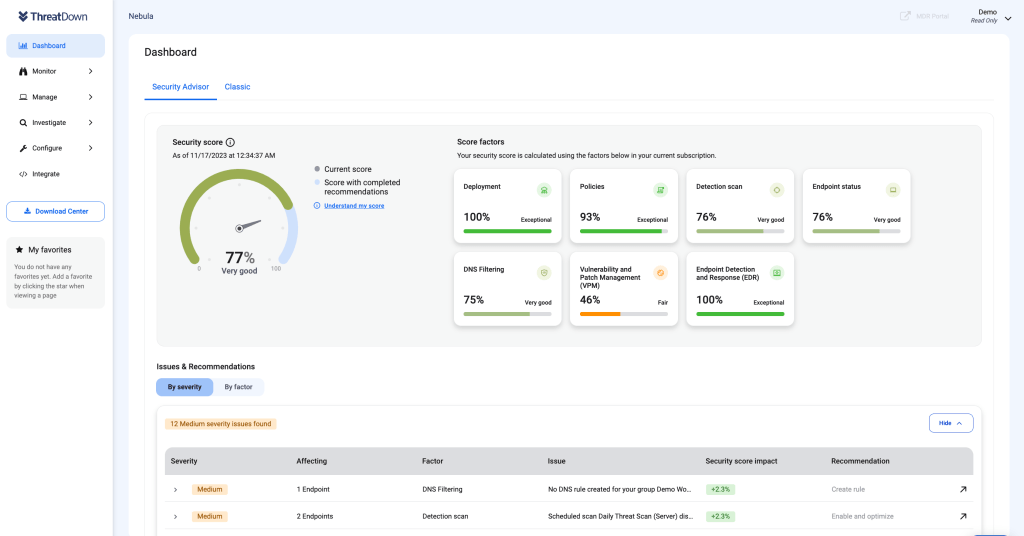
Traditional approaches to endpoint security today have a three-fold complexity problem—with big consequences.
First, complexity in deployment causes long delays in protection, directly impacting ROI and leaving organizations vulnerable to breaches. In fact, almost 10 percent of small security teams cite such complexity as a primary reason for deployment setbacks. (Global Surveyz, 2022)
Second, lack of integrated security tools can lead security teams to overcompensate by buying and operating additional security platforms. This complexity multiplies operational overhead and creates gaps in security.
Dealing with day-to-day complexity with endpoint security is a third challenge. A survey of 200 CISOs by Global Surveyz found that nearly half (45 percent) of small IT teams flag issues like excessive alerts and multiple dashboards as chief product concerns, culminating in alert fatigue and drops in productivity.
To save time, money, and to stop more threats, it’s clear IT teams need an approach to endpoint security that resists complexity—a suite that’s easy to implement, cost-effective, and straightforward to operate.
Enter: ThreatDown bundles
ThreatDown combines the technologies and services that resource constrained IT teams need into four streamlined, cost-effective bundles that take down threats, take down complexity and take down costs:
- ThreatDown Core Bundle: Next-gen AV and threat surface reduction. A simple yet superior solution integrating award-winning endpoint protection technologies.
- ThreatDown Advanced Bundle: Everything included in core plus Managed Threat Hunting and Ransomware Rollback. Tailored for smaller security teams with limited resources.
- ThreatDown Elite Bundle: Everything in Advanced plus 24/7/365 expert monitoring and response by Malwarebytes MDR analysts. Purpose-built for organizations with small (to non-existent) security teams that lack the resources to address all security alerts.
- ThreatDown Ultimate Bundle: Everything in Elite plus protection from whole categories of malicious websites. Perfect for teams looking for a one-and-done shortcut to cybersecurity done right.
Each bundle comes with ThreatDown Security Advisor, which analyzes an organization’s cybersecurity health—such as by assessment of current inventory and which assets are vulnerable—and generates a score based off what it finds, illuminating gaps in defenses and providing actionable recommendations for improvements that can be made in minutes.

ThreatDown Nebula dashboard view. Security Advisor enables organizations to visualize and improve their organization’s security posture in just a few minutes.
1. Seamless Deployment
With the average deployment timeline for traditional EDRs stretching up to 18 months for small security teams, the need for a swifter solution is clear.
Simply put, smaller teams just can’t afford extensive learning curves, which perhaps is why, from a financial standpoint, they prioritize implementation costs (50 percent) in their endpoint security more than anything else. (Global Surveyz)
ThreatDown EDR, the cornerstone of every ThreatDown bundle excluding Core, takes the complexity out of endpoint security deployment as evidenced by an average time to become fully operational that is two times shorter than the industry average.
Cloud-hosted on the Nebula platform, ThreatDown bundle core technology can deploy within minutes and has won multiple G2 awards for its unique combination of rapid time to go live and time to ROI, all delivered via an agent deployed with a small footprint.
2. All-In-One Integration
Managing too many platforms is challenging. Each additional security tool requires its own set of configurations, updates, and management protocols, ultimately translating to longer response times, inefficient workflows, and an inability to have a unified view of the threat landscape.
According to Global Surveyz, 77 percent of small security teams ranked a ‘one-stop’ product with the ‘most integrated’ features as one of their top considerations when choosing a new security technology. In addition, 80 percent of CISOs recognize vendor consolidation as an avenue for more efficient security.
And, once you consider that over 5 percent of breaches in 2022 came from known vulnerabilities that had yet to be patched—and that the average cost of those breaches was $4.17 million—it goes without saying that Vulnerability and Patch Management needs to be part of any all-in-one security solution today.
By combining Endpoint Protection (EP), EDR, an award-winning Vulnerability and Patch Management solution, and more, ThreatDown Advanced, Elite, and Ultimate bundles give IT teams the ‘one-stop’ product they need to streamline detection and response through a single pane of glass.

Patch Management in ThreatDown Nebula.
3. Increased Protection
ThreatDown bundles don’t just simplify the deployment and administration of endpoint security; they simplify the take down of threats as well.
Traditional EDR is inherently exhausting. Without additional context, alerts become just too ambiguous to be actionable, meaning IT teams inevitably end up over-prioritizing less urgent threats while also overlooking severe ones—increasing their risk of a breach.
Starting with ThreatDown Advanced, organizations get access to next-level alert prioritization and threat protection with Managed Threat Hunting (MTH). For customers looking for 24x7x365 cybersecurity protection with proactive alert investigation and threat hunting, ThreatDown Elite and Ultimate offer Managed Detection and Response (MDR) services.
With ThreatDown bundles, organizations no longer need an advanced cybersecurity model and a well-staffed security operations center (SOC) to take down threats. Through a combination of superior EDR technology and human-delivered security, ThreatDown empowers organizations to keep up with the volume of EDR alerts and respond to threats on the fly.

ThreatDown MDR workflow.
Try ThreatDown bundles today
For IT teams plagued by the triad of complex deployment, scattered tooling, and excessive alert noise, ThreatDown bundles emerge as a superior solution that caters to the needs of today’s security teams.
Discover the difference with ThreatDown Bundles and elevate your organization’s defense against cyber threats. Get in touch for a free trial and experience the benefits of a simplified, yet robust, security framework.
如有侵权请联系:admin#unsafe.sh